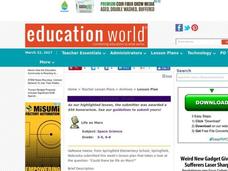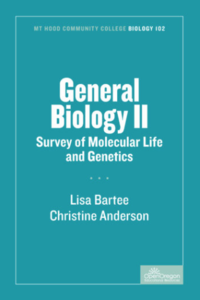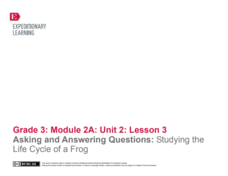Curated OER
A Lesson in Biodiversity: Making Comparisons Between Defensive Mechanisms Utilized by Marine Organisms
If your upper elementary or middle school marine biology learners are going to visit an aquarium, then here is a field trip activity guide for you. It is written specifically for The Maritime Aquarium, but the idea can be adapted to any...
National Center for Case Study Teaching in Science
Life on Mars
Through reading and discussion, aspiring astronomers consider the question of whether or not there was ever life on the planet Mars. Throughout the process, they review how scientific investigations are carried out, examine the...
Curated OER
Life Comes in Cycles
Kids are fascinated by chickens and their eggs. Here is a learning exercise has young learners take a look at the four stages in a chicken's life cycle. They have four cycles to organize: egg, chick, young bird, and adult. They have to...
Curated OER
Ocean Animals - A Kindergarten Research Project
Something’s fishy! Assign each of your pupils an individual sea creature and investigate the oceans. Young oceanographers utilize Kidspiration software to research a creature, illustrate an image, and create fact cards about their...
Journey Through the Universe
Is There Anyone Out There?
What is an alien's favorite game? All-star baseball! Scholars start defining living and non-living. Then, they conduct experiments to research if life exists, keeping in mind that life could be in many forms, not just human.
NOAA
What Little Herc Saw
See the underwater world through a different pair of eyes! Middle school marine biologists identify deep-sea organisms by examining images taken by an ROV from the Okeanos Explorer. After determining what creatures lie beneath the...
Scholastic
Study Jams! Population Growth
Along came a spider, who sat down beside her. She screamed, but RJ wouldn't smash it because spiders are a limiting factor for other insects in an ecosystem. In this video, other common limiting factors for populations are listed....
Curated OER
Rachel's Life is in a Hole
Explore how lack of access to water impacts peoples' lives in poor countries. Through text reading and discussion, middle schoolers are presented with the story of a young girl who lives and functions with limited water resources. They...
Curated OER
Life on Mars
Students research the feasibility of life on Mars and debate what it would need in order to sustain life. They work in teams to predict, research, infer, and explain their theory using models they build.
Scholastic
Study Jams! Animal Life Cycles
Only five slides, but worth the while for introducing upper-elementary zoologists to different animal life cycles. Two types of metamorphoses are explained: complete and incomplete. Stunning photography flows before the eyes of the...
BBSRC
Discovering DNA: The Recipe for Life
A pinch of adenine, a dash of thymine and ta-da, you have life! Well, it's not quite that simple, but through this series of activities and experiments young scientists learn about the structure of DNA and how it contains the recipe for...
Cheetah Outreach
Life Cycles
How does a cheetah life cycle differ from a human life cycle? Kids graph weight gain for humans versus cheetahs and compare other life cycle events such as gestation and life span
Curated OER
National Marine Sanctuaries Shipwrecks
Junior oceanographers access the Channel Islands National Marine Sanctuary Shipwreck Database and plot the locations of several shipwrecks. Shipwrecks are always an enthralling subject and this activity allows your learners to act as...
NOAA
Marine Ecosystems
Be at the top of the food chain when it comes to understanding marine ecosystems. The 21st installment of a 23-part NOAA Enrichment in Marine sciences and Oceanography (NEMO) program investigates marine ecosystems, ocean zones, and food...
Curated OER
Designing a Real Life Ecosystem!
Students research abiotic and biotic factors concerning the concept of an ecosystem. Record and analyze data collected. Write a lab report in proper and scientific format with thinking and analytical skills. Work as a cooperative team.
Curated OER
Talking Trash - Marine Debris
Students bring in different trash items and define "marine debris" through a discussion about these items. They categorize debris and use statistics and graphing to better explain the types and amounts of marine debris found each yea
Curated OER
Butterflies-The Life Cycle of the Butterfly
In this instructional activity, students examine the life cycle of the butterfly. Students look at pictures of the life cycle of the butterfly in pictures and on the computer. Students listen to the teacher read "The Very Hungry...
Curated OER
Pumpkins-Life Cycle of a Plant
In this lesson, Pumpkins-Life Cycle of a Plant, students study the life cycle of a pumpkin. Students will analyze the pumpkin and how it goes from seed to pumpkin over a three days of activities. Students sing a song teaching them about...
NOAA
Marine Policy
Save the oceans! The 22nd installment of a 23-part NOAA Enrichment in Marine sciences and Oceanography (NEMO) program focuses on laws and marine policy. Pupils take part in an activity investigating fisheries stock data.
Curated OER
Unit 1: Water is Life: The Heart and Science Behind this Phrase
Water, water, everywhere — but will there be enough to drink? Check out these detailed lesson plans to meet NGSS water cycle and CCSS literacy standards in your science classroom. Learners do a close reading of a challenging, poetic text...
Open Oregon Educational Resources
General Biology II: Survey of Molecular Life and Genetics (Mt. Hood Community College Biology 102)
What could be more real life than a biology course? Mt. Hood Community College offers a complete biology textbook with an emphasis on genetics. Topics range from DNA replication to biotechnology and inheritance patterns.
EngageNY
Asking and Answering Questions: Studying the Life Cycle of a Frog
A lesson challenges learners to ask and answer questions about the life cycle of a frog. With a class read-aloud, partner discussion, and notebook reflections, scholars complete a three-page worksheet to prove their understanding of the...
NOAA
It's a Roughy Life
Scientists recently discovered several previously unknown species at the Bear Seamount off the coast of New England. Scholars research these new species — benthopelagic, benthic, and seamount fish — and find out what makes them unique....
PBS
The Chrysalis or Pupa
What is one of the most exciting parts of a butterfly's life cycle? When it emerges from its pupa and dries its wings! This is a great activity little ones will love. They discuss what happens during the pupal stage of the butterfly life...
Other popular searches
- Life Skills Worksheet
- Life Skills Math
- Life Skills Lesson Plans
- Real Life Skills
- Math in Daily Life
- Special Education Life Skills
- Basic Life Skills
- Life Skills Lessons
- Nutrition Life Skills
- Plantation Daily Life
- Life Skills Lesson Money
- Computer Budget Life Skills
























